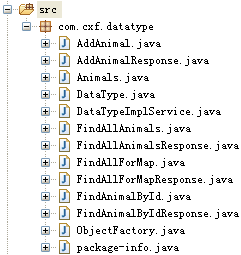4.CXF所支持的数据类型
前言:jdk提供了webService,但为什么使用jdk来开发webService相对少呢?
一个重要原因就是jdk支持的数据类型相对不足,例如Map就不为jdk所支持!
CXF支持的数据类型:
基本数据类型:
int、boolean、float等...
引用类型:
String、集合(Set、List、Map)、自定义数据类型...
补充说明:cxf支持所有的数据类型!
测试案例:
1.构建一个实体类Animals,为了测试基本数据类型,定义了三个属性,int型的id,String的name和float型的price
public class Animals {
private int id;
private String name;//动物名称
private float price;//动物价格
public Animals() {
super();
}
public Animals(int id, String name, float price) {
super();
this.id = id;
this.name = name;
this.price = price;
}
public int getId() {
return id;
}
public void setId(int id) {
this.id = id;
}
public String getName() {
return name;
}
public void setName(String name) {
this.name = name;
}
public float getPrice() {
return price;
}
public void setPrice(float price) {
this.price = price;
}
@Override
public String toString() {
return "Animals [id=" + id + ", name=" + name + ", price=" + price
+ "]";
}
}
2.编写SEI以及SEI实现类
@WebService
public interface DataType {
//添加一个动物
@WebMethod
boolean addAnimal(Animals a); //查找一只动物
@WebMethod
Animals findAnimalById(int id); //查找所有动物(测试List)
@WebMethod
List<Animals> findAllAnimals(); //查找所有动物(测试Map)
@WebMethod
Map<Integer,Animals> findAllForMap();
}
public class DataTypeImpl implements DataType {
@Override
public boolean addAnimal(Animals a) {
//为方便测试,直接返回true
return true;
}
@Override
public Animals findAnimalById(int id) {
return new Animals(1, "car", 50);
}
@Override
public List<Animals> findAllAnimals() {
List<Animals> list = new ArrayList<Animals>();
list.add(new Animals(1, "pig", 2000));
list.add(new Animals(2, "dog", 100));
list.add(new Animals(3, "duck", 40));
return list;
}
@Override
public Map<Integer, Animals> findAllForMap() {
Map<Integer, Animals> map = new HashMap<Integer, Animals>();
map.put(1, new Animals(1, "rabbit", 20));
map.put(2, new Animals(1, "chick", 30));
map.put(3, new Animals(1, "wolf", 20000));
return map;
}
}
3.发布
public class Publish {
public static void main(String[] args) {
String address = "http://localhost:8080/cxfServer";
Endpoint.publish(address, new DataTypeImpl());
System.out.println("如果发布成功,打印!");
}
}
4.使用cxf生成客户端代码

生成后的结构为:

5.查看wsdl文档
<?xml version='1.0' encoding='UTF-8'?><wsdl:definitions xmlns:xsd="http://www.w3.org/2001/XMLSchema" xmlns:wsdl="http://schemas.xmlsoap.org/wsdl/" xmlns:tns="http://datatype.cxf.com/" xmlns:soap="http://schemas.xmlsoap.org/wsdl/soap/" xmlns:ns1="http://schemas.xmlsoap.org/soap/http" name="DataTypeImplService" targetNamespace="http://datatype.cxf.com/">
<wsdl:types>
<xs:schema xmlns:xs="http://www.w3.org/2001/XMLSchema" xmlns:tns="http://datatype.cxf.com/" elementFormDefault="unqualified" targetNamespace="http://datatype.cxf.com/" version="1.0">
<xs:element name="addAnimal" type="tns:addAnimal"/>
<xs:element name="addAnimalResponse" type="tns:addAnimalResponse"/>
<xs:element name="findAllAnimals" type="tns:findAllAnimals"/>
<xs:element name="findAllAnimalsResponse" type="tns:findAllAnimalsResponse"/>
<xs:element name="findAllForMap" type="tns:findAllForMap"/>
<xs:element name="findAllForMapResponse" type="tns:findAllForMapResponse"/>
<xs:element name="findAnimalById" type="tns:findAnimalById"/>
<xs:element name="findAnimalByIdResponse" type="tns:findAnimalByIdResponse"/>
<xs:complexType name="findAllAnimals">
<xs:sequence/>
</xs:complexType>
<xs:complexType name="findAllAnimalsResponse">
<xs:sequence>
<xs:element maxOccurs="unbounded" minOccurs="0" name="return" type="tns:animals"/>
</xs:sequence>
</xs:complexType>
<xs:complexType name="animals">
<xs:sequence>
<xs:element name="id" type="xs:int"/>
<xs:element minOccurs="0" name="name" type="xs:string"/>
<xs:element name="price" type="xs:float"/>
</xs:sequence>
</xs:complexType>
<xs:complexType name="findAllForMap">
<xs:sequence/>
</xs:complexType>
<xs:complexType name="findAllForMapResponse">
<xs:sequence>
<xs:element name="_return">
<xs:complexType>
<xs:sequence>
<xs:element maxOccurs="unbounded" minOccurs="0" name="entry">
<xs:complexType>
<xs:sequence>
<xs:element minOccurs="0" name="key" type="xs:int"/>
<xs:element minOccurs="0" name="value" type="tns:animals"/>
</xs:sequence>
</xs:complexType>
</xs:element>
</xs:sequence>
</xs:complexType>
</xs:element>
</xs:sequence>
</xs:complexType>
<xs:complexType name="addAnimal">
<xs:sequence>
<xs:element minOccurs="0" name="arg0" type="tns:animals"/>
</xs:sequence>
</xs:complexType>
<xs:complexType name="addAnimalResponse">
<xs:sequence>
<xs:element name="return" type="xs:boolean"/>
</xs:sequence>
</xs:complexType>
<xs:complexType name="findAnimalById">
<xs:sequence>
<xs:element name="arg0" type="xs:int"/>
</xs:sequence>
</xs:complexType>
<xs:complexType name="findAnimalByIdResponse">
<xs:sequence>
<xs:element minOccurs="0" name="return" type="tns:animals"/>
</xs:sequence>
</xs:complexType>
</xs:schema>
</wsdl:types>
<wsdl:message name="findAnimalById">
<wsdl:part element="tns:findAnimalById" name="parameters">
</wsdl:part>
</wsdl:message>
<wsdl:message name="addAnimal">
<wsdl:part element="tns:addAnimal" name="parameters">
</wsdl:part>
</wsdl:message>
<wsdl:message name="findAllAnimalsResponse">
<wsdl:part element="tns:findAllAnimalsResponse" name="parameters">
</wsdl:part>
</wsdl:message>
<wsdl:message name="findAllForMapResponse">
<wsdl:part element="tns:findAllForMapResponse" name="parameters">
</wsdl:part>
</wsdl:message>
<wsdl:message name="findAnimalByIdResponse">
<wsdl:part element="tns:findAnimalByIdResponse" name="parameters">
</wsdl:part>
</wsdl:message>
<wsdl:message name="addAnimalResponse">
<wsdl:part element="tns:addAnimalResponse" name="parameters">
</wsdl:part>
</wsdl:message>
<wsdl:message name="findAllAnimals">
<wsdl:part element="tns:findAllAnimals" name="parameters">
</wsdl:part>
</wsdl:message>
<wsdl:message name="findAllForMap">
<wsdl:part element="tns:findAllForMap" name="parameters">
</wsdl:part>
</wsdl:message>
<wsdl:portType name="DataType">
<wsdl:operation name="findAllAnimals">
<wsdl:input message="tns:findAllAnimals" name="findAllAnimals">
</wsdl:input>
<wsdl:output message="tns:findAllAnimalsResponse" name="findAllAnimalsResponse">
</wsdl:output>
</wsdl:operation>
<wsdl:operation name="findAllForMap">
<wsdl:input message="tns:findAllForMap" name="findAllForMap">
</wsdl:input>
<wsdl:output message="tns:findAllForMapResponse" name="findAllForMapResponse">
</wsdl:output>
</wsdl:operation>
<wsdl:operation name="addAnimal">
<wsdl:input message="tns:addAnimal" name="addAnimal">
</wsdl:input>
<wsdl:output message="tns:addAnimalResponse" name="addAnimalResponse">
</wsdl:output>
</wsdl:operation>
<wsdl:operation name="findAnimalById">
<wsdl:input message="tns:findAnimalById" name="findAnimalById">
</wsdl:input>
<wsdl:output message="tns:findAnimalByIdResponse" name="findAnimalByIdResponse">
</wsdl:output>
</wsdl:operation>
</wsdl:portType>
<wsdl:binding name="DataTypeImplServiceSoapBinding" type="tns:DataType">
<soap:binding style="document" transport="http://schemas.xmlsoap.org/soap/http"/>
<wsdl:operation name="findAllAnimals">
<soap:operation soapAction="" style="document"/>
<wsdl:input name="findAllAnimals">
<soap:body use="literal"/>
</wsdl:input>
<wsdl:output name="findAllAnimalsResponse">
<soap:body use="literal"/>
</wsdl:output>
</wsdl:operation>
<wsdl:operation name="findAllForMap">
<soap:operation soapAction="" style="document"/>
<wsdl:input name="findAllForMap">
<soap:body use="literal"/>
</wsdl:input>
<wsdl:output name="findAllForMapResponse">
<soap:body use="literal"/>
</wsdl:output>
</wsdl:operation>
<wsdl:operation name="addAnimal">
<soap:operation soapAction="" style="document"/>
<wsdl:input name="addAnimal">
<soap:body use="literal"/>
</wsdl:input>
<wsdl:output name="addAnimalResponse">
<soap:body use="literal"/>
</wsdl:output>
</wsdl:operation>
<wsdl:operation name="findAnimalById">
<soap:operation soapAction="" style="document"/>
<wsdl:input name="findAnimalById">
<soap:body use="literal"/>
</wsdl:input>
<wsdl:output name="findAnimalByIdResponse">
<soap:body use="literal"/>
</wsdl:output>
</wsdl:operation>
</wsdl:binding>
<wsdl:service name="DataTypeImplService">
<wsdl:port binding="tns:DataTypeImplServiceSoapBinding" name="DataTypeImplPort">
<soap:address location="http://localhost:8080/cxfServer"/>
</wsdl:port>
</wsdl:service>
</wsdl:definitions>
6.测试(获取服务端各种数据类型的数据)
public class TestDataType {
public static void main(String[] args) {
DataTypeImplService factory = new DataTypeImplService();
DataType dataType = factory.getDataTypeImplPort();
boolean bool = dataType.addAnimal(new Animals());
System.out.println(bool);
Animals a = dataType.findAnimalById(1);
System.out.println(a);
List<Animals> list = dataType.findAllAnimals();
System.out.println(list);
Return r = dataType.findAllForMap();
List<FindAllForMapResponse.Return.Entry> entrys = r.getEntry();
for(Return.Entry entry : entrys){
int id = (int) entry.getKey();
Animals name = entry.getValue();
System.out.println(id+":"+name);
}
}
}
运行结果:
true
Animals [id=1, name=car, price=50.0]
[Animals [id=1, name=pig, price=2000.0], Animals [id=2, name=dog, price=100.0], Animals [id=3, name=duck, price=40.0]]
1:Animals [id=1, name=rabbit, price=20.0]
2:Animals [id=1, name=chick, price=30.0]
3:Animals [id=1, name=wolf, price=20000.0]
注意:
map的使用方法略不同,使用dataType.findAllForMap();后,返回的是个Return类,下面是Return类代码:
public class FindAllForMapResponse {
@XmlElement(required = true)
protected FindAllForMapResponse.Return _return;
public FindAllForMapResponse.Return getReturn() {
return _return;
}
public void setReturn(FindAllForMapResponse.Return value) {
this._return = value;
}
@XmlAccessorType(XmlAccessType.FIELD)
@XmlType(name = "", propOrder = {
"entry"
})
public static class Return {
protected List<FindAllForMapResponse.Return.Entry> entry;
public List<FindAllForMapResponse.Return.Entry> getEntry() {
if (entry == null) {
entry = new ArrayList<FindAllForMapResponse.Return.Entry>();
}
return this.entry;
}
@XmlAccessorType(XmlAccessType.FIELD)
@XmlType(name = "", propOrder = {
"key",
"value"
})
public static class Entry {
protected Integer key;
protected Animals value;
public Integer getKey() {
return key;
}
public void setKey(Integer value) {
this.key = value;
}
public Animals getValue() {
return value;
}
public void setValue(Animals value) {
this.value = value;
}
}
}
}
4.CXF所支持的数据类型的更多相关文章
- MySQL知识树-支持的数据类型
本篇学习笔记的主要内容: 介绍MySQL支持的各种数据类型(常用),并讲解其主要特点. MySQL支持多种数据类型,主要包括数值类型.日期和时间类型.字符串类型. 数值类型 MySQL的数值类型包 ...
- Cassandra在CQL语言层面支持多种数据类型
Cassandra在CQL语言层面支持多种数据类型. CQL类型 对应Java类型 描述 ascii String ascii字符串 bigint long 64位整数 blob ByteBuffer ...
- 【原创】C++链表如何像Python List一样支持多种数据类型
用过Python的码友都知道,Python中List支持多种数据类型,如下面代码所示链表li内的数据类型可以是整数,同时也可以是字符串,当然也可以是其他数据类型. 1: >>> li ...
- android sqlite支持的数据类型
Sqlite3支持的数据类型 :NULL.INTEGER.REAL.TEXT.BLOB 但实际上,sqlite3也接受如下的数据类型: smallint 16 位元的整数. interge ...
- Memcache仅仅支持简单数据类型
Memcache仅仅支持简单数据类型 ,复杂数据类型需要应用自己处理 从数据库当中取出数据[User [id=1, username=guowuxin, password=guowuxin], Use ...
- mysql支持的数据类型及其测试
原文:mysql支持的数据类型及其测试 1.基础知识 1.1如何来查看mysql的帮助手册 ?int Help float; 1.2创建表的规则 CREATE TABLE [IF NOT EXISTS ...
- MongoDB 所支持的数据类型 创建和删除集合 创建和删除数据库
数据类型 MongoDB 支持如下数据类型: String:字符串.存储数据常用的数据类型.在 MongoDB 中,UTF-8 编码的字符串才是合法的. Integer:整型数值.用于存储数值.根据你 ...
- 初识Redis系列之三:Redis支持的数据类型及使用
支持的数据类型有五种: string(字符串).hash(哈希).list(列表).set(集合)及zset(sorted set:有序集合): 下面分别对这几种类型进行简单的Redis存取操作 1: ...
- 数据库 -- mysql支持的数据类型
mysql支持的数据类型 数值类型 MySQL支持所有标准SQL数值数据类型. 这些类型包括严格数值数据类型(INTEGER.SMALLINT.DECIMAL和NUMERIC),以及近似数值数据类型( ...
随机推荐
- 01 Apache Solr:提升检索体验 为什么是Solr
背景: 最近开发一个大型的仓储管理平台项目,项目的前身是无数个版本的历史悠久的基于CS模式的Windows桌面程序.然后对于每一个客户,我们可能需要为之定制比较个性化的特殊功能.于是,有一个 ...
- 阅读笔记Multi-task Learning for Stock Selection [NIPS1996]
Multi-task Learning for Stock Selection Joumana Ghosn and Yoshua Bengio 摘要 用人工神经网络预测未来回报以便于做出对应的金融决 ...
- 微信App支付通知验签
微信异步通知: [AcceptVerbs("POST")] public void Notify() { //编码(101-登录无效,102-账号无效,200-成功,201-失败, ...
- 谷歌Cartographer学习(1)-快速安装测试
谷歌自己提供了安装方法,但是安装比较繁琐,我做了一定的修改,代码放到个人github上,https://github.com/hitcm/. ros下面的安装非常快捷,只需要catkin_make即可 ...
- 用clock()函数计算多项式的运行时间
百度百科中定义clock():clock()是C/C++中的计时函数,而与其相关的数据类型是clock_t.在MSDN中,查得对clock函数定义如下: clock_t clock(void) ; 简 ...
- 6. Adapter Class/Object(适配器)
意图: 将一个类的接口转换成客户希望的另外一个接口.Adapter 模式使得原本由于接口不兼容而不能一起工作的那些类可以一起工作. 适用性: 你想使用一个已经存在的类,而它的接口不符合你的需求. 你想 ...
- Spring知识点总结大全(1)
1.Spring的分层结构 1.Presentation layer(表示层) (1) 表示逻辑(生成界面代码) (2) 接收请求 (3) 处理业务层抛出的异常 (4) 负责规则验证(数据格式,数据非 ...
- Jquery常用radio取值,checkbox取值,select取值,radio选中,checkbox选中,select选中,及其相关设置
获取一组radio被选中项的值:var item = $('input[name=items][checked]').val(); 获取select被选中项的文本:var item = $(" ...
- web工具网站等
框架 1.handlebars http://handlebarsjs.com/ 2.http://underscorejs.org/#keys 3.http://stylus-lang.com/ 4 ...
- 断言(ASSERT)的用法
ASSERT ()是一个调试程序时经常使用的宏,在程序运行时它计算括号内的表达式,如果表达式为FALSE (0), 程序将报告错误,并终止执行.如果表达式不为0,则继续执行后面的语句.这个宏通常原来判 ...
